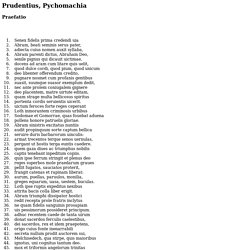

De Prudence par Adémar de Chabannes. Psychomachie de PrudenceparAdémar de Chabannes B.U.
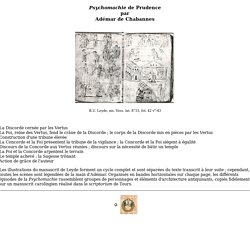
Leyde, ms. Voss. lat. 8°15, fol. 42 v°-43 La Discorde cernée par les Vertus La Foi, reine des Vertus, fend le crâne de la Discorde ; le corps de la Discorde mis en pièces par les Vertus Construction d'une tribune élevée La Concorde et la Foi présentent la tribune de la vigilance ; la Concorde et la Foi siègent à égalité Discours de la Concorde aux Vertus réunies ; discours sur la nécessité de bâtir un temple La Foi et la Concorde arpentent le terrain Le temple achevé ; la Sagesse trônant Action de grâce de l'auteur Les illustrations du manuscrit de Leyde forment un cycle complet et sont séparées du texte transcrit à leur suite ; cependant, toutes les scènes sont légendées de la main d'Adémar. Prudentius. Aurelius Clemens Prudentius(348 – after 405) Encyclopædia Orbis Latini Christian Latin poet whose Psychomachia ("The Contest of the Soul"), the first completely allegorical poem in European literature, was immensely influential in the Middle Ages.
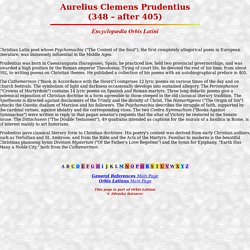
Prudentius was born in Caesaraugusta (Saragosse), Spain; he practiced law, held two provincial governorships, and was awarded a high position by the Roman emperor Theodosius. Tiring of court life, he devoted the rest of his time, from about 392, to writing poems on Christian themes. He published a collection of his poems with an autobiographical preface in 405. The Cathemerinon ("Book in Accordance with the Hours") comprises 12 lyric poems on various times of the day and on church festivals. Prudentius gave classical literary form to Christian doctrines. General References Main PageOrbis Latinus Main Page This page is part of Orbis Latinus© Zdravko Batzarov. Aurelius Clemens Prudentius. Help support New Advent and get the full contents of this website as an instant download.
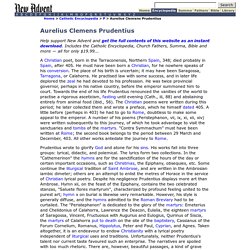
Includes the Catholic Encyclopedia, Church Fathers, Summa, Bible and more — all for only $19.99... A Christian poet, born in the Tarraconensis, Northern Spain, 348; died probably in Spain, after 405. He must have been born a Christian, for he nowhere speaks of his conversion. The place of his birth is uncertain; it may have been Saragossa, Tarragona, or Calahorra. He practised law with some success, and in later life deplored the zeal he had devoted to his profession. Prudentius wrote to glorify God and atone for his sins. The two principal didactic poems are the "Apotheosis", on the dogma of the Trinity, and the "Hamartigenia", on the origin of sin. His most personal work is the invective against Symmachus. Comments Sources GLOVER, Life and Letters in the Fourth Century (Cambridge, 1901), 249-77; SCHANZ, Gesch. der röm. About this page APA citation. MLA citation. Transcription. Contact information.
Poetry and the Cult of the Martyrs. Prudentius' Peristephanon is a collection of martyr texts from a vital period in the growth of martyr cult in the West.
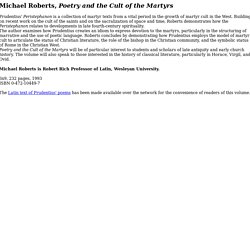
Building on recent work on the cult of the saints and on the sacralization of space and time, Roberts demonstrates how the Peristephanon relates to developments in late fourth-century spirituality. The author examines how Prudentius creates an idiom to express devotion to the martyrs, particularly in the structuring of marrative and the use of poetic language. Roberts concludes by demonstrating how Prudentius employs the model of martyr cult to articulate the status of Christian literature, the role of the bishop in the Christian community, and the symbolic status of Rome in the Christian West.
Poetry and the Cult of the Martyrs will be of particular interest to students and scholars of late antiquity and early church history. Cyberhymnal. Born: 348, Spain (either at Saragossa, Tarragona, or Calahorra).
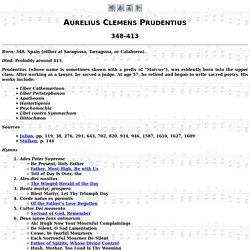
Died: Probably around 413. Prudentius (whose name is sometimes shown with a prefix of “Marcus”), was evidently born into the upper class. After working as a lawyer, he served a judge. At age 57, he retired and began to write sacred poetry. His works include: Liber CathemerinonLiber PeristephanonApotheosisHamartigeniaPsychomachiaLibri contra SymmachumDittochæon Sources. Index of /gopher/other/journals/Recentiores/Prudentius. Prudentius. (université de Pennsylvanie) Praefatio Senex fidelis prima credendi uia Abram, beati seminis serus pater, adiecta cuius nomen auxit syllaba, Abram parenti dictus, Abraham Deo, senile pignus qui dicauit uictimae, docens ad aram cum litare quis uelit, quod dulce cordi, quod pium, quod unicum deo libenter offerendum credito, pugnare nosmet cum profanis gentibus suasit, suumque suasor exemplum dedit, nec ante prolem coniugalem gignere deo placentem, matre uirtute editam, quam strage multa bellicosus spiritus portenta cordis seruientis uicerit. uictum feroces forte reges ceperant Loth inmorantem criminosis urbibus Sodomae et Gomorrae, quas fouebat aduena pollens honore patruelis gloriae.
